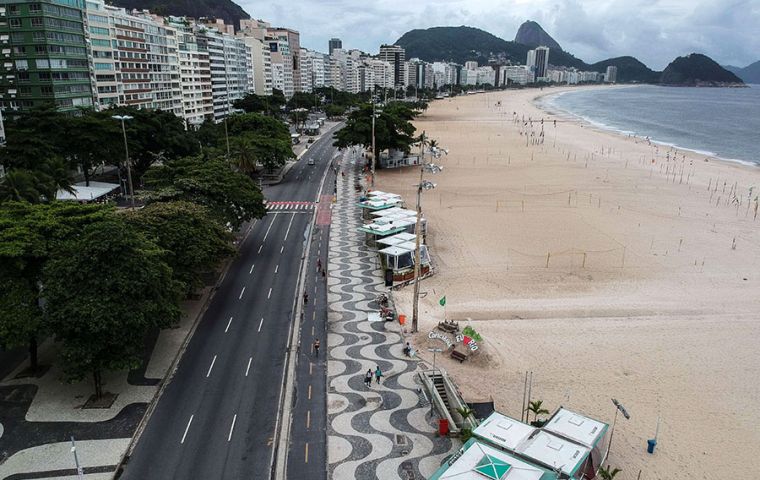MercoPress. South Atlantic News Agency
Copacabana and Ipanema beaches sparkling as they are empty of sunbathers
 While Rio has relaxed lockdown measures aimed at curbing the spread of the virus, most locals are still shunning famed beaches like Copacabana and Ipanema
While Rio has relaxed lockdown measures aimed at curbing the spread of the virus, most locals are still shunning famed beaches like Copacabana and Ipanema Rio de Janeiro's golden beaches are sparkling a lot more during the coronavirus pandemic, as residents and visitors stay away, revealing miles of pristine sand along the spectacular shore.
While Rio has in recent weeks relaxed lockdown measures aimed at curbing the spread of the virus, most locals are still shunning famed beaches like Copacabana and Ipanema as a precaution.
Where once there was a forest of umbrellas, music blaring, and hardly an inch of sand unoccupied, now the only sound is the turquoise sea lapping at the largely empty bays, dotted with the occasional sunbather. The beach volleyball courts are empty.
Biologist Mario Moscatelli said that the dearth of visitors and traffic was giving the city's beaches a breather in several ways.
“It is something positive...without humans on the beaches, the empty space is being occupied by native fauna that have not been seen here for a long time”
Decades of heavy beach traffic have taken a toll on the beaches and their waters. Rio's Guanabara Bay may look pristine on the surface, but life in its waters has long been impacted by the stress of thousands of daily beachgoers.
Moscatelli is sanguine that after the pandemic, a better balance may be found between nature and human life in Rio.
He hopes society will learn from the lockdown measures “and understand that health and the environment are our greatest treasures, and what our health depends on.”




Top Comments
Disclaimer & comment rulesCommenting for this story is now closed.
If you have a Facebook account, become a fan and comment on our Facebook Page!